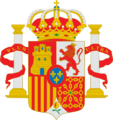Militar Directory of Primo de Rivera facts for kids
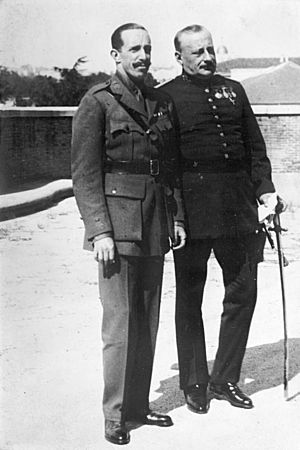
The Military Directory of Primo de Rivera was the first part of a special government period in Spain called the Dictatorship of Primo de Rivera. This happened during the time of King Alfonso XIII, right after General Miguel Primo de Rivera took control in a military takeover between September 13 and 15, 1923.
The Military Directory was a group made up only of military officers (eight generals and one admiral). General Miguel Primo de Rivera was in charge. Their job was to help him run the country and create new laws. The regular Spanish Parliament, which was elected in April 1923, was closed down.
In December 1925, the Military Directory was replaced by a new government. This new government, also led by Primo de Rivera, included both military officers and regular citizens. It was known as the Civil Directory. This was the second and last part of Primo de Rivera's time in power, which ended in January 1930.
This military government was different from fascism, which was strong in Italy at the time. While it had a single ruling group, the old powerful families still controlled much of the country. However, it did share some ideas with fascism, like corporatism, which means organizing society by groups like workers and employers.
During this first period, the Military Directory had two big successes. First, they helped solve the war in Morocco. Second, they brought back peace and order in Catalonia. These were problems that earlier governments had struggled with. Once these issues were sorted out, Primo de Rivera wanted his government to continue. He planned to create a new, strong government system with a "single party," similar to what was happening in Fascist Italy. This party was called the Patriotic Union.
Contents
How the Military Directory Began
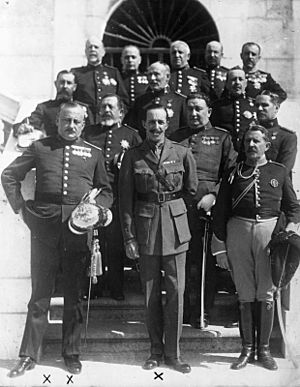
After the disaster of 1898, the Army started getting more involved in Spain's political life. For example, in 1905, military officers attacked a newspaper office in Barcelona because of a cartoon about the Army. This led to a law in 1906 that gave military courts power over certain civilian cases. Later, in 1917, military groups called "Defence Boards" became very powerful.
The military takeover by Primo de Rivera on September 13, 1923, was the peak of this trend. It was the first time the armed forces truly took over the government. They brought the Army's way of thinking into all parts of public life.
When Primo de Rivera met King Alfonso XIII on September 15, 1923, they agreed on a plan that looked legal. Primo de Rivera was named "Head of the Government" and "sole minister." He would be helped by the Military Directory. This group had eight generals, one from each military region, and one admiral representing the Navy.
The official government newspaper announced the King's decision. It also published the first order from Primo de Rivera. This order created the Military Directory. It said the Directory would have "all the powers, ideas, and responsibilities of a whole Government." Primo de Rivera promised this would be a "brief pause" in Spain's normal constitutional way of doing things. He said they would bring back normal government as soon as possible.
Sir: Your Majesty has asked me to form a Government during a difficult time for our country. I have helped cause this situation, inspired by strong love for our country. It would be wrong to refuse such a responsible and demanding job. But Your Majesty knows that neither I, nor those who supported this new government with me, feel ready for all the specific tasks of ministers. Our goal was, and still is, to make this a short break in Spain's constitutional path. We want to fix things so that we can soon find good people, not affected by the problems we see in current political groups. Then, we can offer them to Your Majesty so that normal life can return quickly. That is why I suggest to Your Majesty the creation of a Military Directory, led by me. This group will not have official minister roles, but it will have all the powers and responsibilities of a full Government. I will be the only one to sign the decrees for Your Majesty. I will also be the only one to swear loyalty to the Country and the King, and promise to bring back the Constitution as soon as Your Majesty accepts the government I propose. Sirs, the country has welcomed us with great cheers and hope. We believe it is our duty to change how we act, so that history and our country see our actions as selfless and patriotic. Madrid, September 15, 1923.
The decree said Primo de Rivera would lead the Military Directory and could propose laws to the King. It also said the Directory would have eight generals and one admiral. Primo de Rivera would sign all decrees, acting as the "sole Minister," but only after getting advice from the Directory. The old positions of Prime Minister and other ministers were removed.
A few days later, the government announced that the Congress of Deputies and part of the Senate were closed. The King was supposed to call them back within three months. When this time passed, the leaders of the Congress and Senate asked the King to reopen Parliament, reminding him of his duty. But the King immediately removed them from their positions. Primo de Rivera said, "The country is no longer impressed with liberal and democratic movies; it wants order, work and economy."
In December 1923, the Directory was reorganized. The generals in it could now take on ministerial responsibilities. In June 1924, they could even sign decrees for the King's approval, which only Primo de Rivera could do before. This made the Directory act more like a regular government.
Bringing Back "Social Peace"
The Army Takes Charge of Public Order
The main goal of the new government was to bring back "order," which they felt was broken. They did this by putting the Army in charge. The Army had huge power, with no one to question them. They didn't have to answer to Parliament, and they could act almost however they wanted because the Constitution was suspended. This meant Spain was in a constant "state of emergency."
First, a "state of war" was declared across Spain, which lasted until the Military Directory ended in December 1925. Then, Primo de Rivera replaced local leaders (like governors and mayors) with military officers. From April 1924, some civilian governors were brought back, but important tasks like censorship and public order stayed with the military.
Also, many crimes were now handled by military courts. This included "political crimes" (like showing flags that weren't Spanish or using other languages in official events) and common crimes like robbery or handling explosives.
The people in charge of this "public order" policy were General Severiano Martínez Anido, who became a top official in the Interior Ministry, and General Miguel Arlegui, who led the police. The Civil Guard, a national police force, also got back its independence.
These strong measures did reduce attacks and strikes. Between 1923 and 1928, there were only 51 attacks, compared to 1,259 in the four years before. Strikes also went down, partly because the economy was doing well during the "roaring twenties".
The Somatén
Another early decision was to spread the Somatén to all of Spain. The Somatén was a group of armed citizens from Catalonia. The new "National Somatén" was made up of men over 23, led by generals. Primo de Rivera said it would help keep order and encourage people to support the new government.
Even though Primo de Rivera tried to compare it to Italy's Fascist "blackshirts," the Somatén was mostly made up of middle-class citizens who supported the government. They helped enforce conservative rules and religious behavior. In the countryside, they stopped common crimes like theft. In cities, they worked with the Army and police to stop "social crimes" like strikes. However, over time, the Somatén became more of a ceremonial group, mostly parading in official events.
Limiting Rights and Freedom: Censorship
With the Constitution of 1876 suspended, many basic rights were taken away. One of the most controlled was freedom of expression. On the very day the Military Directory started, strict press censorship was put in place.
It was forbidden to criticize the government, talk about any punishments the government gave to its enemies, or mention regionalist ideas. News about strikes, public disturbances, crimes, or scandals was also censored. You couldn't comment on problems with food, fuel, or transportation. Detailed information about military issues in Morocco was also banned. Attacks or jokes about foreign leaders were not allowed. News about Russia was censored, while fascism was shown in a good light.
Newspapers that broke these rules could be fined or shut down. Many newspapers, especially Heraldo de Madrid, were often fined or suspended. Their pages would have blank spaces or black lines where text was removed. This meant newspapers could no longer share opinions freely. For example, in Madrid, the number of newspapers dropped from 41 in 1920 to just 16 by the end of the Dictatorship.
In 1924, a special office was created to control newspapers, called the Office of Information and Censorship.
The freedom of assembly (the right to gather in groups) was also severely limited because of the "state of war." The government could also move judges around, which meant the courts were not truly independent. This left people with less protection against government actions.
Stopping Anarchist Unions
The Military Directory quickly decided how to deal with workers' groups. They said workers' associations were fine for education and helping each other, but not for fighting against production. This led to different treatment for the anarchist union CNT and the socialist union UGT.
Primo de Rivera tried to get the socialists to work with him. This caused a split among socialists: some, like Julián Besteiro and Francisco Largo Caballero, wanted to cooperate, while others, like Indalecio Prieto, were against it. The group that wanted to cooperate won. Socialists joined a new Labor Council, and Largo Caballero even joined the Council of State.
However, the government was very harsh on the CNT. They demanded that CNT unions show their records and accounting books. This was an excuse to close their offices and arrest or exile their leaders without trial. Many CNT groups went underground. In May 1924, the government banned the main CNT unions and closed their newspaper, Solidaridad Obrera. This greatly weakened the CNT, especially in Catalonia, where it was already struggling from violence and internal conflicts.
Ending Caciquismo
Primo de Rivera saw himself as a "iron surgeon" who would fix Spain's problems, especially caciquismo. Caciquismo was a system where powerful local bosses (caciques) controlled politics and elections, often through unfair means. Primo de Rivera said he would end this system.
He told the press, "Let's see what nine men of good will, working intensely for nine or ten hours a day, can do in the space of ninety days."
Besides bringing "social peace," another main goal was to "clean up" public life by getting rid of the cacique networks. Military officers were put in charge of local governments and investigated corruption. They even created a special military group to look into alleged wrongdoings by politicians. More than 800 local governments were investigated, and many officials were dismissed.
Government Delegates
A new role, the "government delegate," was created in October 1923. These were Army officers (chiefs or captains) assigned to different areas. Their job was to report problems in local councils, suggest solutions, and encourage new civic life.
However, these delegates were "not very effective." Some even became corrupt themselves or acted like local bosses. They were criticized for turning their areas into "mini-kingdoms" and for abusing their power. Part of their salary and expenses were paid by local towns, which caused more complaints. Because of these issues, the Directory reduced their powers and their number over time.
Local and Provincial Laws
The government also tried to reform local administration with the 1924 Municipal Statute. This law said that "the State, in order to be democratic, must be supported by free municipalities." However, mayors were still appointed by the government, not elected by the people.
Another step to fight caciquismo was dissolving the provincial councils in January 1924, except for those in the Basque Country and Navarre. New members were appointed by military governors, usually from business or professional backgrounds. This upset some regional groups, like the Lliga Regionalista in Catalonia, who had initially supported Primo de Rivera.
However, historians say the Dictatorship didn't truly get rid of caciquismo. Instead, it just changed who was in charge. Many old caciques joined the new government party, the Patriotic Union. The government's actions also led to more bureaucracy, which sometimes made corruption easier. The main reason caciquismo weakened was that the old political parties were out of power for a long time.
The Church and the Government
The Catholic religion was very important in Primo de Rivera's plans to fix the country. He promised to protect the Church's interests. King Alfonso XIII even gave a very religious speech to the Pope in Rome in November 1923, saying Spain would always defend the Catholic faith.
One of Primo de Rivera's first actions was to give up the State's right to choose bishops for Spanish dioceses. This power had always been held by the government. As a result, new bishops who were very traditional Catholics were appointed, like Pedro Segura y Sáenz, who became a cardinal at a young age. The only conflict the government had with the Church was when Catalan bishops refused to order priests to preach in Spanish.
The Patriotic Union: An "Apolitical" Party
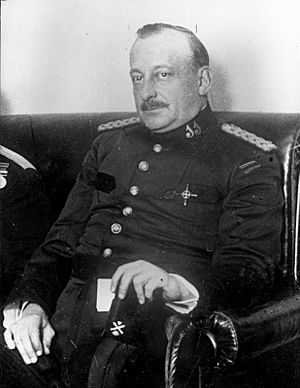
A few months after taking power, Primo de Rivera realized that just "cleaning up" the country wasn't enough. He wanted a "new politics" supported by "healthy people" who would form a "political party, but apolitical." This party would not decide what policies to use, but would help manage the country. Its motto was "less politics, more administration."
To start this new party, Primo de Rivera first considered a group in Barcelona that copied fascism. But after visiting Italy in November 1923, he chose to base his party on Catholic right-wing groups. This led to the creation of the Unión Patriótica Castellana (UPC), which aimed to be like Italy's Catholic Partito Popolare Italiano. Its first leader was a Catholic professor, Eduardo Callejo de la Cuesta. The UPC believed in traditional Catholic values, property rights, and farming.
In April 1924, Primo de Rivera told his government delegates to "unite and organize all men of good will." He said the new party would be "apolitical" in the usual sense, meaning it wouldn't have a specific ideology. It would bring together all Spaniards who believed in "Religion, Homeland, and Monarchy." This was similar to the Carlist motto "God, Homeland, and King." The party would not follow the old Constitution. Its job would be to encourage citizens to form a strong group that the King could rely on, leading to a return to normal government.
The Patriotic Union was a party "organized from power and for power," as one of Primo de Rivera's ministers said. Primo de Rivera described it as "a central, monarchical, moderate and serenely democratic party." One of its thinkers, José María Pemán, said it was different from fascism and that it supported a "traditional social-Christian" state. He also rejected universal suffrage (the right for everyone to vote), calling it a "great mistake." The party was made up of traditional Catholics, conservatives, people who didn't care much about politics, and those who just wanted to get ahead.
The Patriotic Union was mostly strong at the local and provincial levels. Its national leadership didn't have very clear roles. The party's newspaper, La Nación, which was supported by government money, was important for holding the party together.
However, the Patriotic Union wasn't very good at getting rid of caciquismo. Many former caciques joined the party, and new ones even appeared. For example, in Primo de Rivera's home province of Cadiz, almost all the traditional caciques joined the Patriotic Union.
Strengthening Spanish Nationalism and Fighting "Separatism"
From "Healthy Regionalism" to "Spanishness"
Primo de Rivera's takeover was partly justified by what he called "shameless separatist propaganda." Five days later, a decree was issued against "separatism," punishing "crimes against the security and unity of the Homeland" with harsh penalties, judged by military courts. The government immediately pushed for a strong, fighting Spanish nationalism. Symbols and groups related to other nationalisms were targeted. Censorship limited not only democratic and workers' newspapers but also publications in other languages. Political activities were severely restricted, and regional nationalisms were forced to go quiet until 1929.
At first, Primo de Rivera seemed to support "healthy regionalism." He even asked the Basque provincial councils to create a draft for a special regional law. He also said he wanted to replace the 49 small provincial administrations with 10 to 14 larger regions, giving them more power while keeping Spain united. He made similar offers to regional groups in Galicia, Valencia, and Aragon. However, this "regionalist" idea soon faded away.
In January 1924, Primo de Rivera dissolved most provincial councils, just as he had done with city councils. The new members were appointed by military governors. In Catalonia, the appointment of strong "Spanish nationalists" to lead the provincial councils upset the Lliga Regionalista, who had initially supported Primo de Rivera.
Primo de Rivera put a young lawyer, José Calvo Sotelo, in charge of reforming local and provincial governments. Calvo Sotelo and his team, made up of conservatives and right-wing Catholics, helped create the Municipal Statute of 1924 and the Provincial Statute of 1925.
In a long note about the Provincial Statute, Primo de Rivera admitted he had changed his mind about "regionalism." He used to think it could help Spain, but now he believed that strengthening regions and their unique identities would "undo the great work of national unity."
Stopping Catalan Language and Culture
The government's "nationalizing" plan also reached schools. They wanted to teach "patriotic" and religious education. In October 1923, teachers were reminded to teach and speak only in Castilian Spanish. Later, inspectors could close schools or suspend teachers who didn't follow this rule. In October 1925, school directors were ordered to watch out for any "anti-social doctrines or against the unity of the Fatherland" taught by professors. Books not written in Castilian or those against national unity had to be removed.
In Catalonia, it quickly became clear that the Lliga Regionalista was wrong to support Primo de Rivera. He immediately started a policy of attacking Catalan nationalism. For example, the Catalan language was banned in official events. Attempts were made to stop its use in church sermons. Spanish became the only administrative language. Catalan place names were changed to Spanish. The traditional Jocs Florals (poetry contests) were boycotted and had to be held abroad. Raising the Catalan flag was forbidden, and Sardana dancing was limited. Professional, union, and sports groups were targeted just for using Catalan.
This policy caused many conflicts with Catalan groups and institutions that refused to accept it. Many were temporarily or permanently closed. For example, some offices of the Lliga Regionalista were closed, and its newspaper La Veu de Catalunya was temporarily suspended.
In January 1924, Primo de Rivera met with Catalan political leaders in Barcelona. He only got support from the Spanish nationalist National Monarchist Union. Its leader, Alfonso Sala Argemí, became president of the Mancomunitat (a group of Catalan provincial councils) after its previous leader resigned. However, Sala eventually disagreed with the military authorities in Catalonia and complained to Primo de Rivera. So, when the Provincial Statute was approved in March 1925, which effectively ended the Mancomunitat, Sala resigned.
After the Mancomunitat disappeared, Primo de Rivera spoke even more harshly about Catalonia's culture, identity, language, and institutions. He was completely against any regional self-rule. Historians say that Primo de Rivera offended not just political groups but all of Catalan society. This led to a growing distance between Catalonia and the government, with more and more conflicts. A group called Acció Catalana even took the "Catalan case" to the League of Nations. Francesc Macià, a former military officer who founded Estat Catalá, became a symbol of Catalonia's resistance to the government.
Stopping Basque Nationalism
The government also harshly suppressed Basque nationalism, especially the more radical part of the Basque Nationalist Party (PNV). Just a week after forming, the Military Directory closed Aberri, the PNV's newspaper, and ordered the Civil Guard to close PNV centers. This made the PNV effectively illegal.
Both the PNV and another Basque nationalist group then focused on promoting religious activities (like pilgrimages), leisure activities (like hiking), cultural activities (dance, theater, music, promoting the Basque language), and sports (soccer and cycling).
Peace in Morocco
From Leaving Morocco to the Al Hoceima Landing
General Primo de Rivera had always wanted to pull Spanish troops out of Morocco. So, he ordered the troops to withdraw to the coastal area. This upset the "Africanist" officers in the Army, who had served in Africa. One of them was Lieutenant Colonel Francisco Franco. He wrote articles defending Spanish control in Morocco. These officers didn't want to leave Morocco because it meant an end to quick promotions for "war merits." Officers in Africa could get promoted much faster than those in Spain. Franco himself was promoted quickly from lieutenant to commander in just five years because of his service in Africa.
In March 1924, Primo de Rivera ordered troops to withdraw from certain areas in Morocco. But the withdrawal happened in terrible weather, and Abd el-Krim, the leader of the Rif Republic, used this chance to attack. The operation was a disaster, with many casualties. Abd el-Krim took control of a large part of the Spanish protectorate. Primo de Rivera managed to hide the full extent of the disaster from the public thanks to censorship. But in October 1924, he had to take personal command in Morocco.
The situation was saved only when the Rif rebels made a mistake and attacked French positions in the spring of 1925.
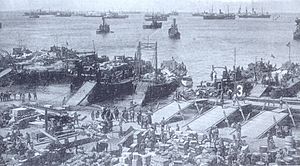
Abd el-Krim's attack on French-controlled areas made France willing to work with Spain to end the rebellion. This led to the Al Hoceima landing in September 1925. It was a huge success because it surprised the enemy from behind and split the rebel-controlled area in two. By April 1926, Abd el-Krim asked for peace talks, and by the next year, Morocco was completely peaceful for Spain. Abd el-Krim surrendered to the French, who sent him to Reunion Island.
Historians say that the victory in Morocco was the biggest success of Primo de Rivera's government. It set the stage for his foreign policy. Primo de Rivera wanted to stay in power after 1925 precisely because he had solved a problem that had been a nightmare for Spanish leaders since 1898.
The Question of Responsibilities
After the parliament was closed and documents about military responsibilities were seized, trials for military officers accused in the Annual disaster were handled by the Supreme Council of War and Navy. General Cavalcanti, a member of Primo de Rivera's inner circle, was found not guilty, which caused the head of the Supreme Council to resign. Later, in June, the trial against General Dámaso Berenguer and other officers involved in the Annual disaster began. Berenguer was forced to leave active service, but others were found not guilty or received light sentences. In July 1927, Primo de Rivera gave amnesty (a pardon) to Berenguer and the others who had been found guilty. This helped calm the disagreements within the Army about who was responsible for the disaster. Once the war was put in the hands of the "Africanist" officers, there was no longer a point in continuing the difficult discussion about responsibilities.
See also
 In Spanish: Directorio militar de Primo de Rivera para niños
In Spanish: Directorio militar de Primo de Rivera para niños
Images for kids



